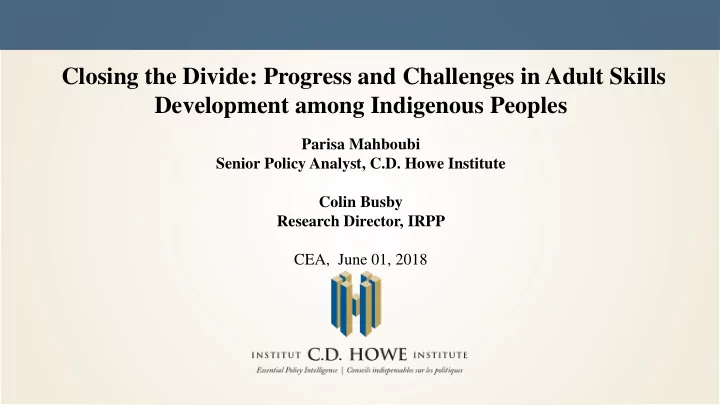

Closing the Divide: Progress and Challenges in Adult Skills Development among Indigenous Peoples Parisa Mahboubi Senior Policy Analyst, C.D. Howe Institute Colin Busby Research Director, IRPP CEA, June 01, 2018
Introduction Importance of Higher Literacy and Numeracy Skills Provide better employment and earnings potential Foundational for on-the-job performance Facilitate the application of skills Enhance productivity 2
Assessing the Skills Gaps 3
Assessing the Skills Gaps: Education 4
Assessing the Skills Gaps: Education 5
Assessing the Skills Gaps: Region 6
Assessing the Skills Gaps: Age 7
What is to blame? 8
Labour Market Outcomes Distribution of Indigenous and Non-Indigenous Sub-Groups by Employment Status 100% 19 19 32 33 80% 4 6 11 11 60% 40% 77 75 57 56 20% 0% Non-Indigenous First Nations Metis Inuit Employed Not Employed Not in the Labour Force 9
Labour Market Outcomes Distribution of Employed Indigenous and Non-Indigenous by Occupation (percent) Management Business, finance and administration Natural and applied sciences Health Education, law and social Art, culture, recreation and sport Sales and service Trades, transport and equipment operator Natural resources, agriculture Manufacturing and utilities 0 5 10 15 20 25 30 Indigenous Non-Indigenous 10
Conclusion Main Findings Skills gaps between off-reserve Indigenous people – First Nations, Métis and Inuit – and non-Indigenous Canadians are wide among those without a high- school education – a gap compounded by relatively high dropout rates among Indigenous youth. Skills gaps are largest in northern communities, the western provinces and in Ontario. Importantly, the gap in literacy scores between Indigenous and non-Indigenous population shrinks with more education, but both First Nations and Inuit experience large skills gap at any education level. differences in education levels and the characteristics of the home environment explain the largest share of this gap. But, the PIAAC data only allows us to evaluate foundational skills among adults and how well these skills translate into labour market success. 11
Recommendations To ensure a prosperous future for Indigenous people The focus of policymakers should be on developing skills during primary and secondary education. How? Collecting more data that track the performance of Indigenous students to better understand the causes for differences in student outcomes Provincial student assessments International Student assessment (PISA) 12
Thank you!
Recommend
More recommend